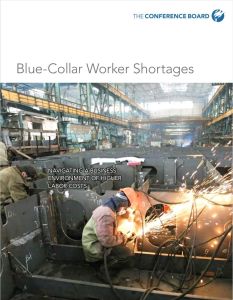
Report
Blue-Collar Worker Shortages
Navigating a Business Environment of Higher Labor Costs
The Conference Board,
2018
Read or listen offline
automatisch generiertes Audio
1×
automatisch generiertes Audio
Recommendation
With more and more Americans striving for a college degree, fewer people are competing for traditional blue-collar and low-wage service jobs. Conference Board economists Gad Levanon and Frank Steemers offer an insightful perspective on how this trend is likely to accelerate, as US economic growth continues and employers have to contend with labor shortages for these less prestigious jobs. This illuminating, focused and amply illustrated piece is likely to interest policy experts, economists and human resources professionals.
Take-Aways
About the Authors
Gad Levanon is the chief economist for North America at the Conference Board, where Frank Steemers is an associate economist.
By the same authors
Report
Article
Report




















Comment on this summary or Diskussion beginnen